#this applies to villains not antagonists who aren't villainous
Explore tagged Tumblr posts
Text
(sadly) unpopular/controversian opinion: i can't stand villains who are 'right'.
it's overdone and boring.
it's misunderstood, misinterpreted, reduced to being non-thinking lazy shorthand for 'look i made a DEEP™ villain'.
it inevitably leads to the narrative and cultural/paradigm shift vilification of neutral (at worst) to good ideals.
morally myopic.
upholds the status quo.
if you're going to make your villain 'have a point', just make them a hero. 'good intentions, just went about it in extreme way' is the language (and thus thought pattern accepted as utter truth of reality) used to snuff out all resistance to structures of power.
it's deeply irresponsible propaganda. dangerous even at its best.
and did i mention it's boring?
#i'm sick to death of it#just had to get it out#i don't know why my brain wandered here honestly#usually it goes here after i think about bad writing in eso#or xmen's history#obviously i don't hate 'complex' villains#take a look at my list of fav villains#but this is not 'complexity'#ramblings#this applies to villains not antagonists who aren't villainous#obviously
9 notes
·
View notes
Text
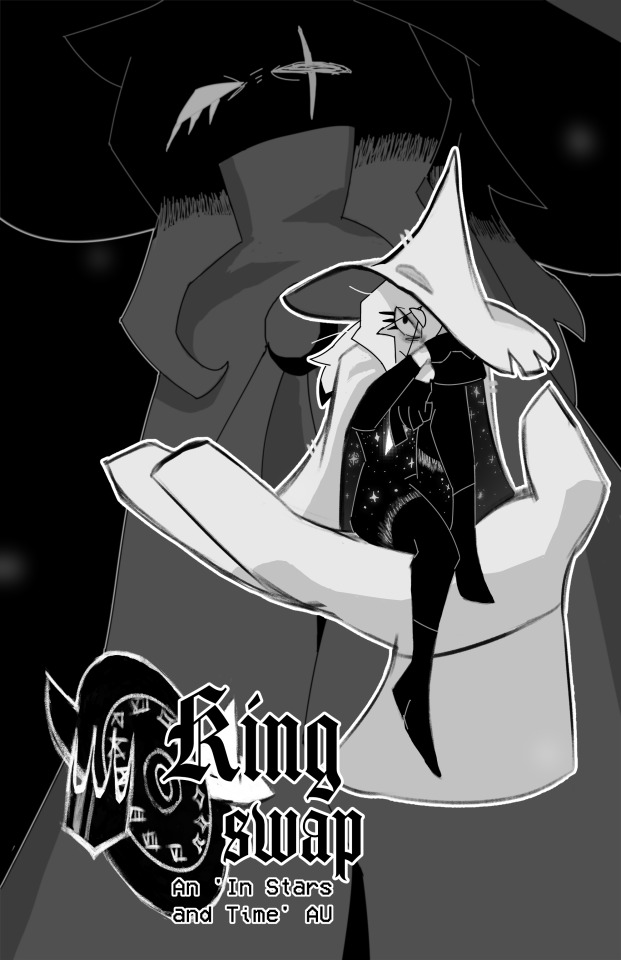
The Stagemaster
(What's Kingswap?) Meet the Stagemaster, the main antagonist of this little Kingswap AU i've been cooking. The fellow who could have been Siffrin, had their life not taken a different path. In this post, I'll cover a bit about where he came from, their personality, what they're capable of, and other bits and pieces.
Well...maybe not everything. A fellow has to keep some mystery to himself.
As a blanket statement, this AU is just full on spoilers for 'In Stars and Time', and any content warnings that apply to the game apply to this post under the cut!
So...where'd the Stagemaster come from? How'd our Beloved Siffrin end up like this?
Truth be told, no one is born a villain, and the Stagemaster is no different. As I spoke a bit about it in the previous post, the Stagemaster starts in a different place than canon Siffrin; already a young adult, staying in Corbeaux before the Island is disappeared. Think of him as the equivalent of a university student away from home.
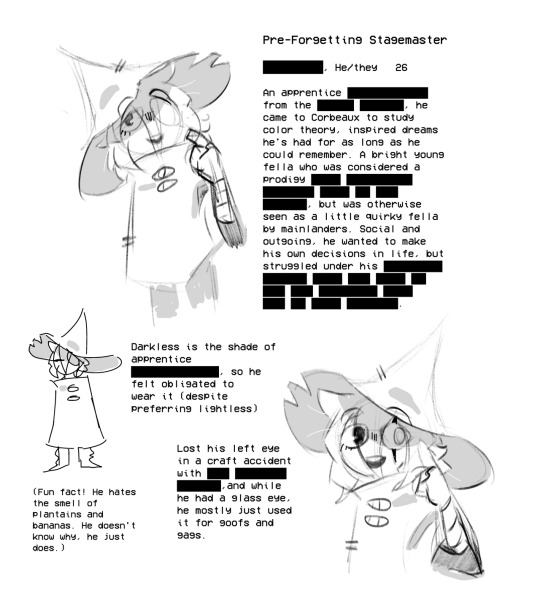
Awwww, look at them! So full of whimsy and so many thoughts in that little head of his! I'm sure nothing bad will ever happen to him ever.
He has a life, he has goals and desires, he has friends in Corbeaux (who aren't The Party we know), and he also has strange dreams but that's not a big deal.
Unfortunately, we know how this ends - The Fella Who Could Have Been Siffrin wakes up one day without a name, without any memories of where he came from, and a whole city and House of people who don't know him anymore. Sure, he has some memories, like why he was studying in Corbeaux, that he had people who he loved, but everything else is just swiss cheese in his head.
He doesn't take it very well.
At some point after the Big Forgetting, after trying to reclaim ANYTHING that's his (and failing miserably)...Not-Siffrin makes a request. A small, selfish wish...for just a little bit of control in their life.
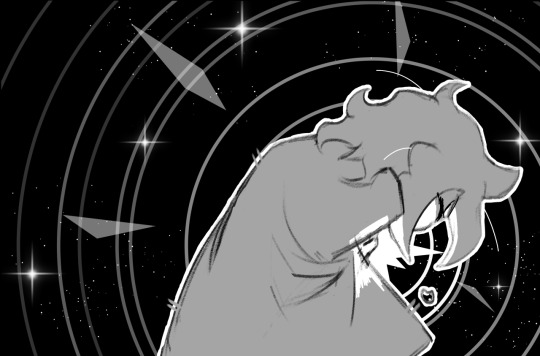
You've heard of eating stars, but I present the thrilling sequel(?): Hugging a star so hard you shove it into your ribcage.
And so is born a stranger with nothing to lose and a general spite of having his life messed with...and a desire to mess with other peoples lives in some form of messed up retaliation. Crashing out and making it everyone's problem.
So, What is the Stagemaster Capable of? Is his gimmick still freezing time, or does he have a new skillset?
Both! But the focus for the Smaster is a new thing called 'Control Craft', inspired partially by ISAT Siffrin's view that he was controlling or puppeting his friends/family like actors...so, the Stagemaster takes that concept and makes it very literal!
He also has the floating Disembodied Hands because I Think That's Cool.


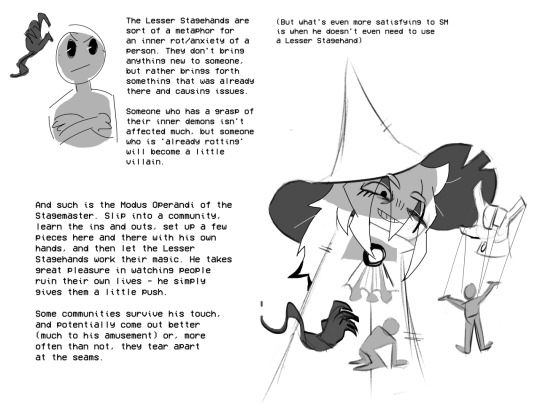
Well before the start of the Loops, and even earlier before the King starts his Time Freezy thing in the main timeline, the Smaster is living his best life, playing with their toys (the toys are other people.) He's sort of a travelling ghost, wandering at his whims to hone his skills, so he's messed with all sorts of places across several countries before even starting his grand torment of Vaugarde.

Vaugarde has it too good, in the Smasters opinion, so, he wants to just subject its people to being Crabs-In-A-Bucket and fighting among themselves before he freezes them. He's pretty petty like that.
The rarity of his Tears makes it a bit hard to do the freezing thing...so it's very convenient he is able to outsource them to this Suspiciously Present Sadness That Technically Shouldn't Exist In This AU!

What Kind of Person IS the Stagemaster, Anyways? What's Their Personality?
I'm going to be so real with you, reader, I just threw a bunch of villains whos vibes I really liked into a blender
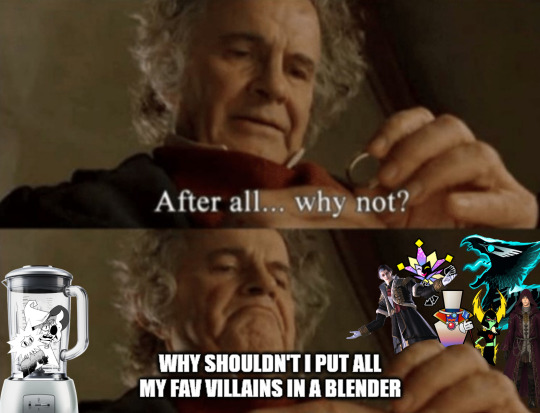
( Emet-Selch (Final Fantasy 14), Dimentio (Super Paper Mario), Count Bleck (Super Paper Mario), Cheline (Phantomarine (Please read Phantomarine)), Lord Dominator (Wander over Yonder) Fandaniel (Final Fantasy 14))
But in all seriousness, I went with a more low down approach to the Stagemaster - the ISAT fandom generally likes focusing on the more Unhinged, Manic version of Siffrin we see from Act 5, and it's a good approach! I love unhinged manic Siffrin, but, I really wanted to explore the more quiet and avoidant aspects of both Siffrin and Loop (while still being theatrical and fun to watch), while also adding some new bits into them.


(If you know where I stole these quotes from, you get a cookie)
I will be so real with you, the Stagemaster is just fun to draw in general, especially peeled (Without the hat or the cloak)
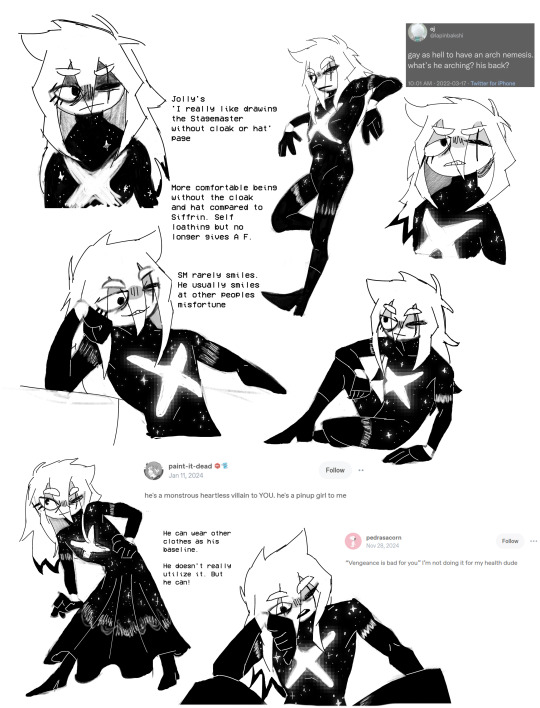

Also...strangely...He knows a lot about the party. Weird!
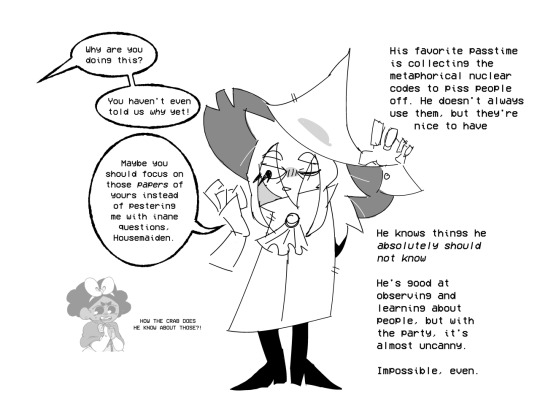
I'm sure it means nothing.
Hey, I've read the Intro post to the AU, and there's this talk of the Stagemaster having a Big Form and a Little Form That Exists At the Same Time - whats with that? Are they Clones?
Not clones! But the same person with two bodies.

But...why does he need this?
You see...the Stagemaster did his whole Thing in Vaugarde, with ruining communities and friendships and stuff...and then went 'yeah, lets move on, time to do Dormont'. Unfortunately, for him Euphrasie, the Head Housmaiden, kind of planned in case he set his sights on the House of Dormont, and forced him to 'go loud' as it were.
Hey, do you also remember why there's so many locked doors in The House of Dormont in baseline ISAT? And the Party eventually figures out it was the Housemaiden's actively locking stuff up to keep the King in? That also applies to this AU.
Long Story Short: Euphrasie played him like a fiddle, put up enough of a fight to force him to Go Big Mode, and then before she was frozen, she activated the whole Orb Door dealio, trapping the Stagemaster in the House.
Even in an AU where Siffrin isn't the looper, Euphrasie still gets to be his metaphorical jailer. Because I think it's funny.
Sure, the Stagemaster could just sit on his laurels. He technically already won, the Time curse is spreading, Vaugarde will be trapped eventually...but so will he. And he would rather be Free than to Win, so...The Avatar comes into play, allowing the Stagemaster to pick up the pace of his Freezing Vaugarde thing, and to have some fun.
This also lets the Stagemaster have a presence in the Pre-Loop Orb Quest the Party goes on to open the Big Orb Door.
But uhhh...

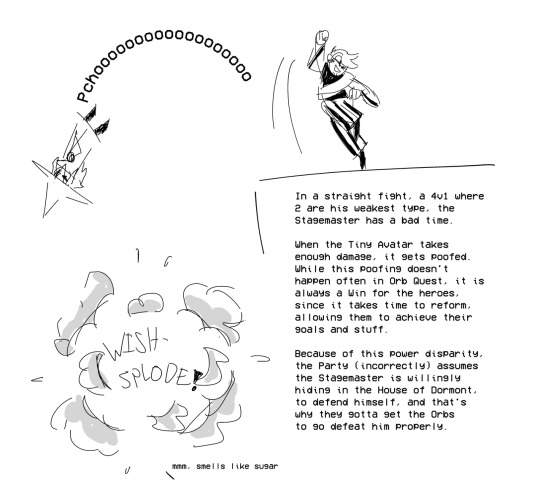

yeah the smaller form is much weaker and the Smaster gets his ass kicked in a straight up fight, forcing him to be sneaky during Orb Quest Antagonism. Usually he cultivates and wrangles powerful Sadnesses for the party to fight.
Eventually, the party suspects that maybe the Stagemaster is weaker than everyone thinks, that he's hiding in the House of Dormont because the Party will easily defeat him, so he's stalling for time to freeze Vaugarde.

Yeah, he's turned the Party into a way for him to free himself. (Funny, then, that they're never getting out of this House anyways, because a certain long haired Knight trapped himself in a silly little Timeloop) (Unfortunately for Clovis, our swapped King...he's not the only one here who is aware of the loops. Good luck, Clovis!)
And that's all for today! Thank you for reading! Hopefully this is the last 'Pre timeloop' info post before I actually get into the Time Loops Proper...But it's so fun to speculate and imagine snippets of the previous adventure!
(As always, a special thanks to the ISAT discords AU channel for listening to my brainrot, and thanks to everyone who's expressed such enthusiasm for these posts!)
#isat#in stars and time#isat kingswap au#isat spoilers#jpdoesart#long post#isat siffrin#I have so much fun just doodling this little guy#he's so nasty#nasty and mean and really a feral cat#having a crisis and taking it out on everyone out of spite tee hee#if this post gets edited its because I saw a typo or something#oops i forgot a whole ass picture imma just sneak that in
300 notes
·
View notes
Note
How would you (if you were Ryan Condal) have fleshed out book Aemond in s1 without woobifying him too much?
Good question anon!
If we're going book!Aemond and keeping the book timeline, I think there's very little chance of woobification because Aemond plays a much more overtly antagonistic role in F&B from the start. I think lots of HotD fans, even those who have read the book, kind of mentally default to the show version of Driftmark, but the book version has him pushing a 3 year old into dragon poop and he's absolutely beating the shit out of Jace when Luke-- who is 5-- runs up and slashes his eye. Baela and Rhaena aren't there so there's really no "stealing Vhagar" plotline, and while it's 2 on 1, Aemond won the fight, taunts them by calling them bastards, which makes them engage again, and is once more winning the fight when Luke gets in a lucky shot. The same criticisms of the adults still apply of course, and Viserys is still equally useless at acknowledging Aemond's injury, but it is harder to feel sorry for the guy when he is the one doing the bullying and the bullying just so happened to backfire horribly. And I think that while it is true that for Alicent, this incident proves once and for all that Viserys does not care what happens to her children, what book!Aemond takes from this is that he will never allow himself to be beaten by someone he considers his "lessers" again (and the Strong boys are half his age, so this is a humiliating defeat, not necessarily something he'd want to be coddled over). There is this fanon idea of Aemond, is the dutiful son who does what he is told, who does everything right but gets shat on for it, and who finally gets sick of playing by the rules and snaps. But Aemond (and I'd argue this even applies broadly to show!Aemond) is actually quite defiant and combative from the start, often to the detriment of himself and his family. Not only is he not as competent as he believes himself to be, he causes a lot of his own problems and then gets mad when others do not want to help him fix them.
I do not necessarily think Aemond needs a sad backstory to be a good character, and I've never cared for the show's take on his villain origin story. The bullied kid becomes a mass murderer is a tired trope in 2025 but I think it falls flat with Aemond in particular for a number of reasons that I won't get into here (and Aemond's messy and incoherent S2 arc is a direct product of the show's inability to pull off his heel turn-- I could write an entire post about that in and of itself). I think if I were adapting book!Aemond, I would lean into Aemond's problems with authority and the massive chip on his shoulder that comes from him being a powerful, warlike, ambitious man with no outlet for his ambitions. Not only is he not the secondborn son, he's pushed further down the line of succession by Viserys keeping Rhaenyra as his chosen heir. He's never knighted, despite being an excellent fighter, is not betrothed during Viserys' lifetime so he will have no holdings of his own, and although he accepts his role as the "enforcer" of the family, he clearly believes he would make a better king than Aegon, whose claim he must nevertheless uphold. And to be clear, I do not believe book!Aemond has studied history and philosophy (or the Valyrian language for that matter) to any greater extent than Aegon has, he is simply a warrior whereas Aegon is not, but to Aemond that is all that matters.
So I would show Aemond as man who has followed the tenets of Westerosi masculinity but who has not, in his own view, reaped the rewards that he believes should be his due. I would juxtapose this with Aegon, who is the eldest son but who has never been treated as an eldest son and therefore does not even attempt to perform the swordbro variety of Westerosi masculinity because what would be the point? It would get him nowhere and worse than nowhere, it might cast him as a true threat to Rhaenyra's inheritance. Aemond's disdain for Aegon therefore would come not from Aegon's failure to embrace his "duty," because there is no duty for Aegon to embrace, and Aemond doesn't care about duty anyway, he cares about power. Aegon's hedonism makes him soft in Aemond's estimation, and that is what Aemond cannot tolerate (which is not to say he does not love his brother, he just does not respect him). In contrast, Aemond has learned that there are few problems that violence cannot solve provided you have an unlimited capacity for violence, and his cruelty grows in proportion to his ability to enact violence upon others. The more he is enabled by his family (who also cannot tell him no or punish his misdeeds in any significant way because Vhagar is too important to the war effort), the bolder he grows. Remember, there is a reason why Aemond, much like Maegor, turns his nose up at the idea of making a trip to Dragonstone to claim a hatchling (which, despite Viserys' condescending phrasing, is very likely how Aegon claimed Sunfyre). No mere hatchling will do for Aemond, it has to be a war dragon. He needs to be, if not the one wearing the crown, then the one with the most firepower, the one who cannot be refused.
Even Aemond's one canonical romance, with Alys, is one in which he claims her as a "war prize," and Alys feeds his ego with visions of the future, giving him an excuse to abandon his allies and family. He takes Alys along with him when he seeks out Daemon, as she has become a sort of talisman, proof that he will emerge victorious-- she has seen it in her visions, after all, or so he believes. Soon the war itself becomes secondary Aemond's own self aggrandizement and his need to justify all of his previous acts with ultimate victory, not for the greens, but for Aemond himself. And again, I would contrast this with Aegon, who undergoes a transformation during the war, his sense of self shattered and pieced back together again in a way that he never truly recovers from. He shows himself to be tougher and more tenacious than anyone expected, but the cost of this transformation is his body, his health, his dragon, and most of his family. In the end Aegon is exhausted by the effort it takes to survive, clinging to the last shreds of his humanity in his refusal to execute a child, and increasingly more concerned with how his family is remembered than with his own legacy, commissioning statues for his brothers yet none for himself.
In Aemond's final days, he does not negotiate, he does not coordinate with his armies or his Hand (who is of course long dead due to Aemond's refusal to ), he does not lay patiently in wait or spring any traps; he burns the countryside indiscriminately in search of one man, an effort which brings him no closer to his goal. As he burned the countryside, Aemond must have felt like a god on dragonback, immortal and unstoppable, and yet mere months later the dragons (and Aemond) are no more. I would portray him as a man with more power than sense, whose actions helped ensure that an army that had no real reason to keep fighting would nevertheless refuse to surrender. Ultimately, Aemond and Vhagar can be viewed as a cautionary tale about the might makes right aspect of Targaryen dragonpower. Aemond thinks he can ignore the existing power structures because he has Vhagar and no one can stop him or punish him, and yet his misuse of that power dooms his faction, much as the Dance itself speeds the end of the Targaryen dynasty.
#asks#book!aemond#aemond targaryen#aegon ii targaryen#hotd critical#team green#show!aemond stans i'm sorry please hear me out before you take out the pitchforks#book!aemond was a not a gentle soul#nor was he a victim except that one time he lost his eye to a five year old#warriorbro chadgon truthers i'm also side-eying you
69 notes
·
View notes
Text
How Corrupt Is Hero Society?. Part 2
Nomu and Endeavor, a cause for concern
To add to the today's chatter about Endeavor and his excessive force and how that applies to the rest of MHA's "heroics". I'd like to point something out

It has always been this way
Excessive violence against Nomu isn't anything new, ever since Hori downgraded them into punching bags so the audience wouldnt question the morality of it all.
It does, however bring into light just how desensitized Hero Society is, how they view villains and may display some quirk-ism. Allow me to elaborate.
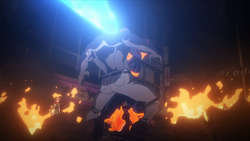
To the publics knowledge this is a PERSON.
The general public, hell most heroes. Had no fucking clue what a Nomu was. To their knowledge this was just someone with a heavy mutation quirk.
And they just, carry on.
Endeavor's gut instinct here was to burn his head off to stop him from regenerating and no one bats an eye.
But don't worry it gets worse.
Gran Torino is someone the community has dug into countless times for his attitudes towards Shigaraki and belief that "killing is another way to save"
So when Torino does this:
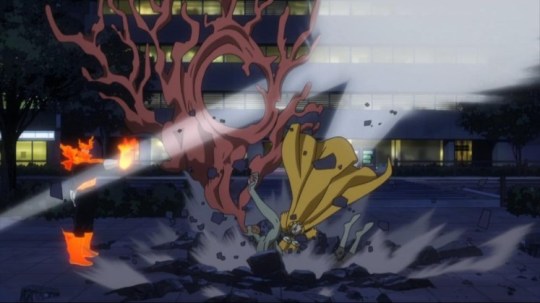
it doesn't really help his case, especially when Endeavor tried to kill that Nomu prior to this by incinerating him alive (almost killing 2 civilians. But I'll get to that)
Such a move would at the very least, sever someone's spine rendering them paralyzed for life. While I can see what Torino was trying to do, the ends do not justify the means here.
I'm not saying the Nomu are innocent, but it's blatantly obvious that they should be aiming to detain them rather than resorting to lethal force right away.
The worst part is the public has no reaction to this. No one asks anything and the authorities sure as hell aren't telling them squat.
We see it again during the Hood Fight and what's worse is that Hood can talk, bringing into question of how sapient is Hood.
Again Endeavor incinerates the Villain and no questions are asked.
Alright remember what I said about the two civilians?. well it gets worse, Firstly, they didn't even know if they were alright until near the end of the Hosu Incident, just letting them run off.
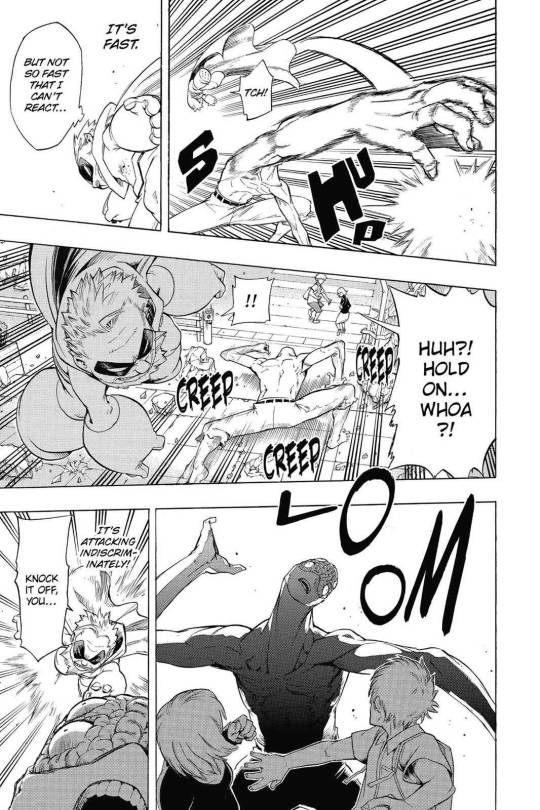
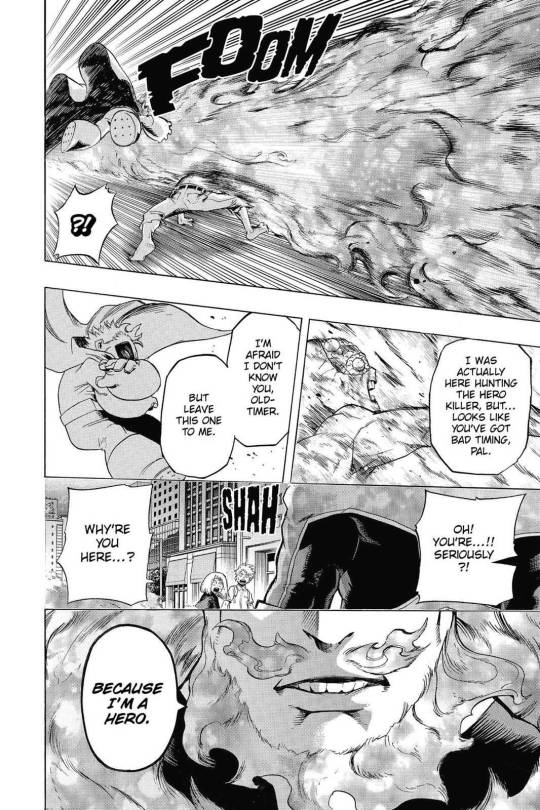
After Endeavor recklessly unleashes a wall of flame, the Nomu absorbs it and processed to reflect the same attack.
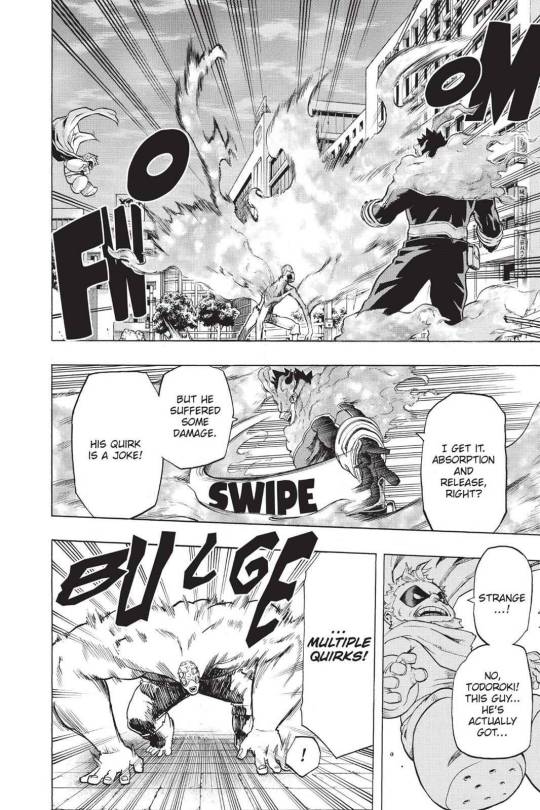
(on a second note: Torino and Enji even refer to the Nomu as if they were fighting a Human!?)
What does this mean?. Well that Enji ran into that fight without thinking!.
He didn't even so much as think up a strategy (just like a certain blonde we all know and despise) for what would happen if the opponent just, didn't die.
In Vigilantes he opts to bathe an entire city block in fire because he can't find the Villain (6)
He creates a fucking fire tornado with no thought for collateral damage

(The reactions of his sidekicks concern me, though knowing how Burnin' reacted to Dabi's exposé I'm not suprised.)
Given that he's this destructive and openly antagonistic in public, I don't even want to imagine the state Rei was in after every "training session" spent protecting Shoto.
This is why looking back, I can't say I'm suprised how some of the civilians dove back into worshipping heroes, even after Hawks killed a man and Heroes left them to fend for themselves.
Because as the saying goes
A bird stuck in a cage believes flying to be an illness
_______________________________________
Additional Info:
As pointed out by @gecmi09 (thank you for bringing that up), Endeavor did indeed refer to Crawler and Popstep as villains, as seen here:
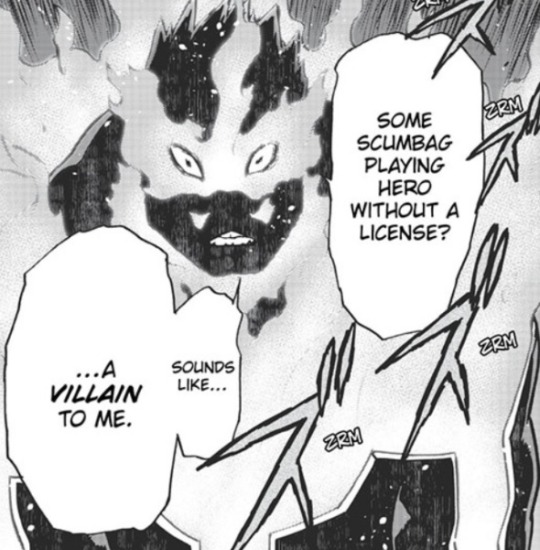

I'd like to draw attention to the fact that he is drawn in a similar manner to Number Six, who is also often drawn in a silhouetted fashion, especially when his true colors are exposed.
The two characters are ironically very similar. Both are willing to resort to destructive means if it means achieving their goals.
Both willingly hurt those around/close them and use flawed logic in an attempt to justify their actions.
Both pretend to be something/someone they're not
Both of them brought about their own demise through one of their victims (Dabi and Knuckleduster [who took in Koichi] respectively. Though Six's was more indirect.)
Even though Vigilantes is loosely attached to MHA, I find it interesting that these two characters are so similar. Really makes you think.
#mha critical#anti endeavor#anti enji todoroki#anti gran torino#the nomu deserved better#at least potential wise#to throw it out there#justice for rei himura#bnha critical#anti bakugo katsuki#if you squint
128 notes
·
View notes
Text
okay okay so hear me out i think that for the most part queerness in naruto falls into 3 categories: accidental, comedic, and villainous, none of which endorse it. comedic and villainous queer-coding actually condemn queerness. not to say that interpretations leaving behind the narrative's biases are flawed, i'm just pointing it out (its a surprise tool that'll help us later). also probably goes without saying but those these kinds of queer-coding aren't unique to naruto.
accidental queer-coding is just that- accidental. queer sexuality is typically a result of the naruto narrative hating women and therefore repeatedly centering male + male relationships, a bit of pandering in some cases (although imo this really only applies to the anime), and a bit of fandom amatonormativity. basically, stuff like naruto and sasuke, where their lack of chemistry with women and continual fixation on each other can easily be read as romantic. queer gender appears less often so i haven't been able to nail down the underlying narrative structures that cause it, but i'm talking about stuff like tenzo/yamato, where he's often read as transmasc due to that anime filler arc that can easily be read as a metaphor for transitioning (cutting his hair, changing his name, ect). the fact that the queerness was accidental doesn't erase the validity of the interpretation, but it does mean that the naruto narrative wasn't endorsing queerness.
comedic queer-coding is just the naruto narrative depicting non-standard gender or sexuality and then pointing and laughing. for instance, kakashi and gai's relationship is often played for laughs. they're "too close" for men, and the narrative expects it to be funny, because that might be gay and comedy can be found in subverting societal expectations. gender-based comedy is similar- naruto turning into a woman is supposed to be funny because he's really a boy. again, the narrative is not endorsing this queerness. it is laughing at it. in some cases, long-term depiction of these kinds of jokes can lead to normalization and therefore lose their comedic impact (see: kakagai marriage or whatever the fuck that was in boruto era) but that's an observed process that happens to long-running gags and doesn't equate to endorsement by the narrative.
villainous queer-coding is the naruto narrative attempting to demonstrate a character's role as an antagonist by depicting them with non-standard gender or sexuality. we know orochimaru is evil because of a lot of reasons, but one of the ways the narrative shows us this is by subtextually implying that he's preying on sasuke. and that's bad because that's gay. according to the narrative. we also see orochimaru play around with gender roles, which further serves to establish his villainy in the narrative. obviously, this is not an endorsement.
there's some overlap between these categories, of course (obito's tobi persona bounces between villainous and comedic queer-coding, for instance, in terms of his feminine behavior). however, as far as i'm aware, there's only one character who can't be sorted into these categories somehow: tenten.
her gender-nonconformity can be sorted into the accidental category, for the most part, because i think a lot of it's a by-product of kishimoto trying to make a strong female character and also her aromanticism. the aromanticism, on the other hand, is directly acknowledged by that narrative. because of that, it can't be accidental, but it is also accepted by the narrative. the fact that tenten does not fall in love is a fact of her personality and identity. i'd like to propose the theory that this happens because tenten is a woman, and the naruto narrative does not respect women. by discarding the perceived feminine flaw of falling in love, tenten is improving her standing in the narrative's eyes, even if doing so requires being queer. this would track with most instances of intentional non-standard gender either being a man acting in a feminine way or a women failing to meet the standards of femininity. because tenten's gender-nonconformity tends to be displayed as her acting in a masculine way, this is considered an improvement by the narrative, and therefore not depicted as a negative aspect of tenten's character. maybe idk i'm not an expert.
#NOT including rock lee + associates because idk what's going on with her gender there to be frank.#like on one level she's immune to criticism of gender via her role as a straight man#but of course comedy roles count as secondary genders and tenten refuses to commit to that either. so what's with that.#i mean i guess that also might be the narrative hating women... and tenten not being a woman overriding the sin of weird gender...#idk i'll think on it. someone save me from naruto gender analysis hell !!
38 notes
·
View notes
Text
"The problem with how Alicent is written in HoTD
There's a feeling of the show wanting to have its cake and eat it too with regards to Alicent. It applies to many other characters, whose actions are immersed in miscommunication, mystery, or just general confusion to create the illusion of complexity (as astutely pointed out by Rolling Stone's review of this season). This is probably my biggest writing philosophy criticism of the show, but it rears its head the most in Alicent Hightower.
In the books, from the very beginning she, like Rhaenyra, is introduced under the banner of "Dangerous Women". This is what it's about, "The Princess and the Queen". She's an ambitious, snarky, manipulative villain. Not very complex, but undeniably important, and even interesting -- albeit only as a concept, remember the history book/s aren't written with ASOIAF-level characterization -- because she's powerful and influential.
In the show, she's just all over the place.
Season 1 does Alicent's arc in the wrong order
So, she starts out being defined by subservience to her father's whims, while also trying to do good and uphold her own morals despite this. This is why she's sympathetic in the beginning. I see Young Alicent's character as the girl who tries her best, under great strain, to make everyone happy -- her father, Rhaenyra, Viserys -- until she finally snaps in Episode 5. The problem is in the following episodes.
We begin Episode 6 with Alicent all the way she needs to be in order to fully resemble her F&B-self. She spends her days complaining to her allies about Rhaenyra, snidely accusing her of mothering bastards, refusing any attempt at reconciliation and pushing Aegon into wanting to be king. Very jarring, but alright, if we want to drop some of that complexity and make her a full-on antagonist (with a sloppily-bridged sympathetic backstory) then that works too.
Yet, Episode 7 weirdly seems to serve to push Alicent into being the person we already saw in Episode 6. It's the wrong way around. The family tension bubbles and boils, she snaps again, and has a moment of being consoled by Otto, which seems to suggest she is now firmly in the "Crown Aegon" camp -- "Together, you and I will prevail" are his words. Rhaenyra and Daemon also get married and firmly name the Hightowers and their kin "The Greens". The lines have been drawn. A bit sloppy but we're there.
Until... we regress yet again in Episode 8. The two are awkward but soon both women enthusiastically cling to rekindle their friendship. All seems to be going well, Alicent declares Rhaenyra the Queen even after years of building allies and apparent scheming with Otto... But then, on Viserys' deathbed he mistakes his wife for his daughter and this one misunderstanding is supposedly what will get Alicent back on Team Green. Alright.
Yet, Episode 9 reveals that Alicent was completely aware of the scheme to crown Aegon as King the whole time! She is shocked, and, unlike in the books, refuses to take part in this treason. It turns out she didn't have a change of heart at that dinner, it's just that she spent the past 8 years after the Aemond incident being blissfully unaware of the plans and... less angry at Rhaenyra, somehow? Plot-holes aside, the misunderstanding makes Alicent come around to the end goal of Aegon on the throne, and she spends the next day finding him so that she can crown him on her terms -- again, apparently completely caught off-guard that this was being planned the whole time.
It's a situation burdened with so much "complexity" that it loses its direction. Considering the muddled characterization of Alicent up until now, her actions feel confusing and, importantly, not that convincing. The most charitable reading of this is that Alicent's motive is staking out her own position, going along with Team Green's goals but for a completely separate reason, and she is apparently so sure in this that it makes her feel ok about blocking Rhaenyra's queenship and assisting her father in his deceptive plans. Despite being very disapproving of his actions. It's a very tough sell that Alicent's conviction regrading Viserys' last words is so stupidly strong that she can maintain this goal without cognitive dissonance, and as hard as Olivia Cooke is trying to sell it, I don't imagine many are buying. Add in the frustration of the audience being aware that her motives are built on a poorly-sold misunderstanding and there's no wonder people don't feel very connected to her.
Here's another issue with this "ambiguity": Alicent is not Daemon. She may hide her feelings to other characters, but she wears her heart on her sleeve for the audience, so there's no excuse for the contradictions. The intention for Alicent Hightower is clearly not to create an enigmatic force of chaos. Instead, it was to make her an understandable and complex character, and the show dropped the ball on that. This failure can be clearly seen in the average viewer, who easily finds plenty of reasons to cherry-pick Alicent's motivations to fit their biases, as they have been doing since the beginning.
And her friendship with Rhaenyra is just all over the place. I'm not saying there can't be a back-and-forth, but what we have is, within seven episodes: a friendship breakup, a rekindling, a fight and another rekindling, another friendship breakup, 18 years of hostility, and another rekindling. Again, within seven episodes. I would say it's exhausting but it's so all over the place that I found it difficult to be invested. And this is coming from someone who was looking forward to seeing this dynamic more than dragons.
The writers can't decide if Alicent is pivotal or incidental to the Dance
Alicent in the show is a thematic commentary on the powerlessness of women in a patriarchal society... except, is she really?
Rhaenyra and Rhaenys certainly seem to believe she holds enough influence to put a stop to the war. In The Green Council, she's apparently confident of her ability to send Council members to The Wall (although no one takes this threat seriously). For some reason, Otto also listens to her every demand when it comes to Aegon.
It's all over the place.
The thing is, we know her actions made no difference. And I don't mean "Ultimately, the same outcome would take place", no, Otto had already found Aegon and implemented his plans. The episode does not present any indication that any of Alicent's actions, after giving birth to Aegon, furthered The Green's cause.
This makes her entire character feel superfluous. Her convictions didn't matter, her actions didn't matter, her impact didn't matter.
The salt in the wound is there are brief sparks of potential where Alicent could have significant and believable control over the narrative, and these are actually set up very well.
There's hints of a slow-building, indirect yet effective form of power, almost perfectly developed and justified. In S1 and S2, Alicent has been effectively set up to have multiple powerful men as allies -- Otto, Criston, Larys. The interesting part comes from how all these relationships are independent of one another, and each man believes his connection with Alicent to be the most important one (you could also throw in Aemond and Aegon). However, despite this setup, neither the writing nor Alicent appear ambitious enough to do anything with it. None of these men actually do her bidding, and the hints at Alicent having some agency are trampled by repeated portrayals beating us over the head with how powerless she is.
I loved the idea of Alicent as a figure who's maneuvered her way into hidden leadership, with these men serving as her arms reaching into different areas of power. Strategic ruling power through Otto, information and intel through Larys, and manpower through Criston. Using Otto's shared interests as a father, Larys' strange Littlefinger-esque obsession with her, and Criston's life devotion to her, it would have again interestingly allowed each man to have their own imagined "It's Alicent and me against the world" fantasy, believably giving her means to exert her will over the narrative.
It would have also been a great way to bring Alicent to the a comparable level of Rhaenyra in terms of influence. Rhaenyra as the queen has direct power; she can order people about and she has a dragon. Alicent on the other hand would represent a more indirect form of influence. This would've made for a dynamic experience when the show swaps between both leads, fulfilling the marketed concept of these two women as the heads of the war in different ways.
Alicent has enough powerful allies to demonstrate her power within the female restrictions of Westeros, but since the show inevitably needs to remind the audience that all the men want war and all the men want peace -- and since is a show that depicts a very bloody war -- she can't actually use that power to do anything meaningful. Alicent (and Rhaenyra) have to be passive for the narrative to work, and I think that's a shame.
The absence of this power has become impossible to ignore in the recent episode. Finally the show must draw a line in the sand and confirm whether she has influence over the show or not. Given it's now a plot necessity to explain why the war doesn't end with the two anti-war leads managing to talk, the writers were forced to go with the latter. It turns out Alicent can't do anything and no one will listen to her. Yet at the same time... it kind of seems like Alicent didn't try very hard?
Because, while in the S2 premiere Alicent agreed with Otto that violence would be necessary, that was only because of Luke's death which she had reasonably assumed made Rhaenyra no longer willing to negotiate. So when Rhaenyra shows up in the Sept, clearly willing to negotiate, why is all we get a hurried vague scene of an overwhelmed Alicent repeating "There was no mistake" and storming out?
Like her ever-changing feelings on Rhaenyra, like her misunderstanding Viserys' last words, like her being remarkably unaware of the succession plan, it's yet another scene which appears to be duct-taping over a previous problem. The show continues to paint itself into a corner with Alicent's motives, and it feels like one big improv act. The only silver lining is it appears the wild oscillations of her character have finally landed on something that will be presumably kept going forward. I wish it was a more believable end point, though -- are neither of them going to continue trying to communicate via ravens? It's not like the trust eroded between the two, so why wouldn't they covertly strategize together to avoid bloodshed on both sides and move towards peace?
It's been a very bumpy road to get to this point, and when you put it down on paper it's understandable why things ended this way. The show's thematic goals and desire to tell a more fleshed out story, having to balance that with the source material, having to balance that with Game of Thrones, including the prophecy for GOT fans then using Viserys' last words to bridge all of it together... then finally needing to clear it up four episodes later so we can press onwards to the Dance.
The other side of the equation, Rhaenyra's character, also shouldn't be swept under the rug, as the flaws in her writing are just as paramount in contributing to this mess. But that's another topic or another day... and perhaps another post.
Conclusion
Despite my comparisons to F&B, it's important to recognize the writers and Ryan Condal were tasked with a much heftier job of needing to flesh out Alicent's motivations and have scene-by-scene justifications for her every action. This is not something GRRM had to do. The show deserves praise for its general accomplishments, and I've really been a fan of S2's character dynamics, even if the motives don't always hold up under a microscope. That being said, I think the writing choices have been frankly arbitrary with regards to when it sticks to or strays from the source material, and the adaptational issues underpin everything.
Alicent Hightower in House of the Dragon, so far, is a shining example of how the source material can deeply hold something back when the writers don't have a strong enough grasp on a characters' independent existence outside of said source material.
There you have it, that's my "The Problem With Alicent" post I've been mulling over for a while.
I hope this provides some interesting discussion on Alicent particularly, as all I see across most social media is either one-note hatred or unenthusiastic guesswork at her motives. Because those motives do change numerous times across episodes, I felt synopses would make this post more full so I apologize for how long it ended up being, but thank you for reading nonetheless."
#house of the dragon#hotd#hotd meta#asoiaf#alicent hightower#team green#pro team green#team black#anti hotd#hotd critical#rhaenyra targaryen#anti alicent hightower
97 notes
·
View notes
Text
One thing i want to talk about is how Danny Phantom A Glitch in Time is pretty similar on themes and character arcs to Steven Universe Future.
In general in DP A Glitch in Time there is this whole idea of searching for a new purpose-¨emotional drive¨ as it get called in the story- in a era where Danny managed to save the day and ¨earn his happy ending¨.
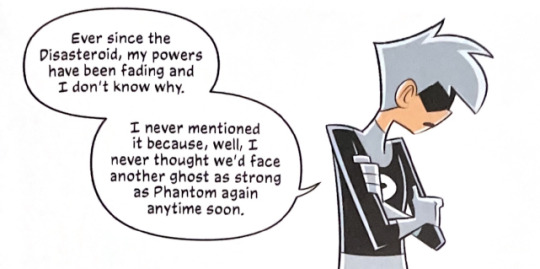
You get a lot of panels of Danny just feeling unhappy with his new status quo, not because he has tons of problems, in fact he has more than he could ever dream of. It's that he feels like he isn't needed as a hero anymore since there are other people that could fight for him. He isn't ¨useful¨, or well, in the way he used to be. He feels like people don't need him to be Amity's protector.
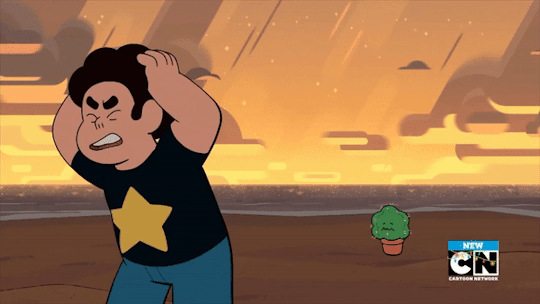
This itself shares a lot in common with the arc that Steven goes through in Steven Universe Future. He feels like people don't need him anymore and still tries doing the same thing he raised himself to be: a ¨helper¨, someone who is defined by his role to help others. This causes Steven to feel lost in his own sense of identity and purpose in an Era that is supposed to be ¨his happy ending¨.
You can see this applied in DP A Glitch in Time with Vlad Masters too. From the start of the story he sends off these vibes that he has been aimless since post-Phantom Planet events. When he returned to his home he found that ¨he had nothing to return to¨ as in the sense nobody missed him nor cared he was dead or alive. He also became enemy number 1 considering how he tried holding the world hostage, making him lose most of the power and position he had.
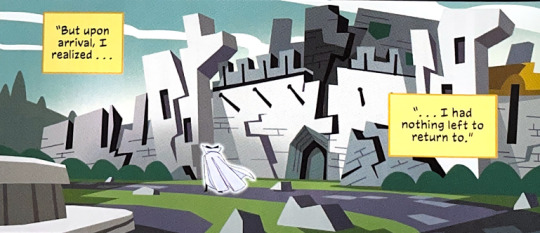
What it is interesting is how Vlad tried going back in time to ¨fix his mistakes¨ by asking Clockwork to give him that chance. From the beginning of the story he admits that he did something wrong, just not what. There is this idea that he isn't interested in being in role of the ¨villain¨ anymore. The worst he does in the story is probably looking forward to keep the origin of ghost powers for himself, aside from accidentally realizing Dan during his fight against Clockwork.
Much like Steven Universe Future, you have these characters struggling to see where they could fit in this new status quo. Their character arcs involve finding a new purpose and learning more about themselves in the process.
Lets talk about Dan Phantom's role in the story. He is the main antagonist from A Glitch in Time. He absorbs Clockwork, master of time, to become more powerful, thus causing terrible time glitches for the rest of the characters. A lot of Dan Phantom's arc in the graphic novel has to do with self-destruction. Him being obsessed with ¨winning¨ and continue fighting even when the fusion with Clockwork is very unstable, is hurting him and destroying the reality at the same time.
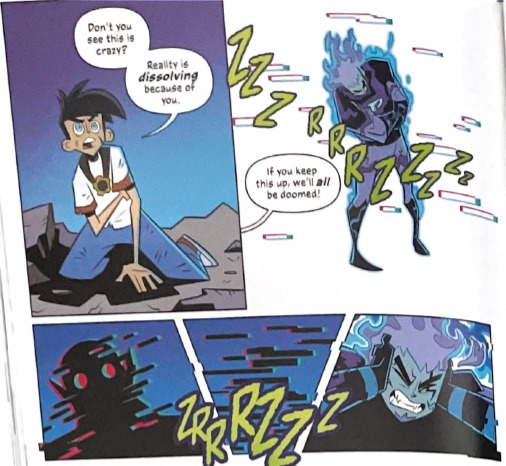
Dan's obsession with ¨winning¨ reminds me quite a lot of Jasper from Steven Universe as well as Steven's arc in SU Future. There is a lot of repeating what the same thing over and over even when it isn't working anymore. The character themselves struggle to be something beyond the the role them or others pushed them into and they don't know what to be outside of that.
In fact, there are some panels Dan reminded me a lot of Jasper, such as when he is getting time glitched/corrupted.
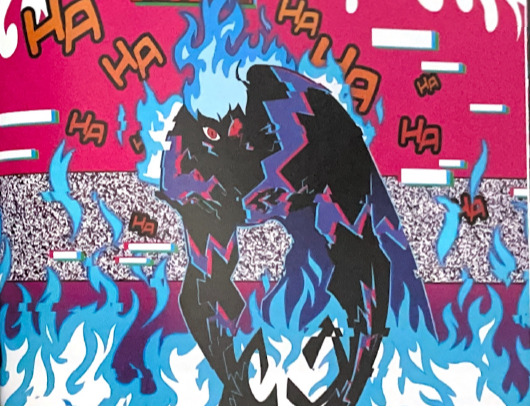
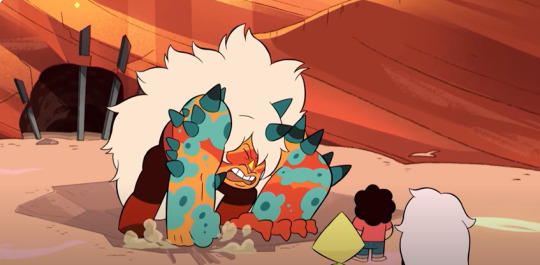
Another main theme in Danny Phantom A Glitch in Time is about the characters getting second chances- the characters in case being Vlad Masters and Dan Phantom. Both characters do the terrible things they do due to their circumstances. They have certain pretty bad things that happened to them that lead them to become evil and hurt people. In addition to this, there tons of mentions of how ghosts aren't evil and they have reasons to do what they do. During the fight against Dan, Danny tries persuading him into stepping down and stopping the fight, pointing out that the timeline is getting destroyed. At one point he asks to Dan ¨why are you so angry?¨.
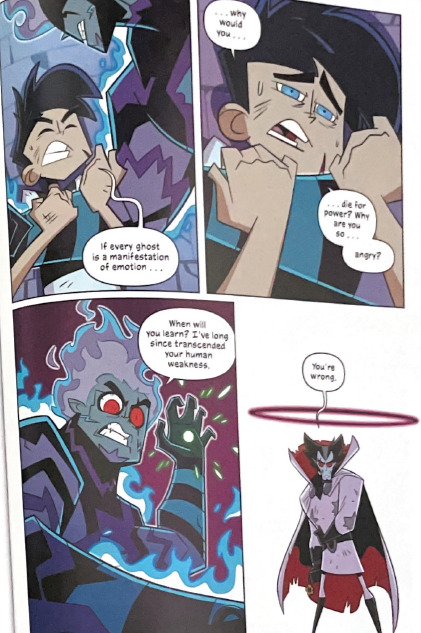
I want to bring up that, yes, this theme is a continuation from the main theme of The Ultimate Enemy episode from the series. But, at the same time, when reading the graphic novel i couldn't help but think about how Steven Universe has these similar ideas of looking into what motivates an antagonist and them being given a second chance to do things right. What really made me think about this more is seeing Dan Phantom, the main antagonist from the novel getting a second chance. Because in any other show, a character like Dan would probably be destroyed but this is something that wouldn't happen in Steven Universe, since it isn't so much about if someone ¨deserves¨ it or not as it is if they choose to change.
I'm not saying that Danny Phantom A Glitch in Time ¨ripped off¨ things from Steven Universe. That would be an absurd conclusion to come to. What i'm discussing here is that it is possible that the graphic novel was influenced by Steven Universe, mainly Steven Universe Future to some extent, in terms of themes and character arcs.
#steven universe#danny phantom#danny phantom a glitch in time#su future#danny fenton#vlad plasmius#dan phantom#steven quartz universe#jasper su
206 notes
·
View notes
Text
Something I see get brought up in quite a few criticisms of HB is that "Stella is purely a one-dimensional villain." and ngl, I really don't like that argument for a few reasons I'm going to discuss in this post.
1. Unsympathetic villains/antagonists aren't new to shows and such, and can work really well in said shows and such, with a good example of this being Jack Horner from Puss in Boots: A Last Wish. At the moment, it's pretty clear that the show is intentionally portraying Stella as an unsympathetic villain, something that has been made even more clear with the release of Mastermind.
So, if you ask me, her being a quote "one-dimensional villain" at the moment, which is basically just another way of calling her an unsympathetic villain in this case, is kind of the point as she helps to move the plot along and adds to some other conflicts and plot points, such as the Stolas and Octavia conflict for example.

2. It's been confirmed that season 3 and season 4 of helluva boss is happening, and those two seasons will contain 15 episodes each, for a total of 30. So, there's plenty of time left in the show for it to cover things like Stella's backstory and such, basically what I'm saying here is to be patient, as again, there's plenty of time for the show to cover Stella's character, plus, we don't exactly need Stella's backstory right now, let it come in due course people. Which takes me right to my next point.
3. 'Vivziepop hearkens Stella's character to the character of BoJack Horseman's mother because they are very similar in that regard.' I'm not going to pretend like I understand in the slightest who she is, but the point is that Stella's character is going to get fleshed out a bit in due course, as I somewhat mentioned in the previous point.
4. 'But wait, isn't her having a tragic backstory/upbringing justifying what Stella has done to Stolas?'
Definitely not justification, it helps to explain why Stella acts and behaves the way she does at her present day, but at the same time, the show is not making an attempt to justify those things about Stella's character.
As for the unsympathetic villain part I brought up earlier, I also do not believe that her likely tragic backstory is supposed to make us feel any sympathy for present day Stella, as, at least in my opinion, any possible sympathy I could've possibly felt for Stella went out the window the moment she started to physically and mentally abuse Stolas. The same line of logic also applies to the fact that Stella was forced into the arranged marriage she didn't want to be in as well, because again, it is not supposed to justify Stella's actions and behaviors, it's purpose is to help explain why Stella behaves and acts the way she currently does.
So yes, while I can understand why she does what she does, that does not mean I feel any sympathy for present-day Stella, and that also does not mean that what Stella has done to Stolas was justified in any way. Trauma does not justify actively abusing your partner in the slightest.
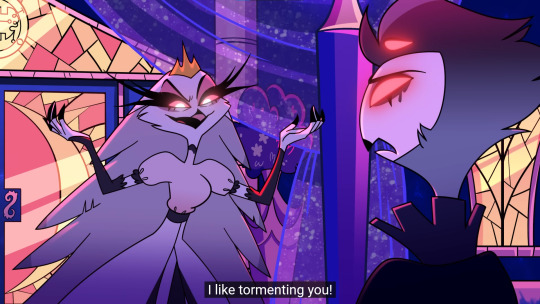
So in conclusion, I have brought up multiple ways why I hate the "Stella is a one-dimensional villain" criticism I see quite a lot when I see Stella get discussed, some proof that Stella's character is going to get fleshed out a bit, including her backstory, and why I think that the writers are intentionally aiming to make Stella an unsympathetic villain in helluva boss, despite said backstory.
36 notes
·
View notes
Note
Sometimes I think certain contestants (in gijinka form) would have been created with things like scars that didn't actually come from an injury or braces/glasses they don't actually need.
Like it's easy to find stereotypical nerdy characters in shows and the like having glasses or braces so Mephone applied that to contestants like Fan and Test Tube without knowing what they're actually for.
There's also the thing where evil characters are given certain types of scars/more noticeable scars than good characters which I can see Mephone using, even if that's a trope that I don't particularly like for a few reasons.
That's not to say there aren't contestants that have bad eyesight or that need braces (among other tropes like that) he might even do the thing where people with glasses become essentially blind if they take them off.
-🌸
[Hi sorry for sending another ask so quickly after my last one but it's sort of related to it and I was going to add it to my last one anyway but I forgot and then remembered like a few seconds after sending it.
In gijinka form, I think Mephone would have a very vague idea of human anatomy.
Like there's certain things that he knows happen to a human body sometimes but not why they happen, things like hunger or period cramps I suppose? I'm pretty sure Mephone eats the cookies more because he likes how they taste than that he gets hungry (correct me if I'm wrong)
I don't think he would know enough to make their organs be the same as actual people either, like he'd screw up their anatomy in certain ways because he doesn't actually know how they work.
Their appearances too, with certain contestants having things that wouldn't really be possible for people to have. Borrowing a but from your Taco gijinka but characters like Yang and her for examples would probably have more claws than nails and teeth sharper than they really should be.
I kind of view them in gijinka form to have something off about them, wether it's obvious from just looking at them (like Goo and Floory) characters that have features that are distinctly non-human or uncanny valley looking but not as in your face (using Yang and Taco again) and those who look like a perfectly normal human but still have screwed up anatomy that someone could probably catch onto eventually (like OJ, I imagine he bleeds orange juice rather than blood in gijinka form)
Their personalities can also be an issue if you're trying to talk to someone who isn't made by Mephone, because some of them have exaggerated personalities for the sake of the show not to say some people don't act like that irl, more that certain people would judge them for it yk? (I hope I'm explaining it right)]
---
Hi Flower!!^^ Welcome back, and thank you for sending in your asks!! :)
Definitely! Scars, glasses, braces, they're like clothes and hair colour, all parts of a character's design! Nerdier characters like Fan and Testy would, like you mentioned, have glasses and such to show their personalities through their appearances! The scars aspect, while yes, not being a good trope, is a common one, though I can't say it would apply to many antagonist-contestants we see in II, other than Knife and maybe Trophy? Taco is fancy, put-together, and deceitful- visible scarring would hurt her facade in that sense, and though I do think of her as having a large facial scar post s2 ep13, that's not something she was made with. Balloon isn't actually malicious, Silver is a similar type to Taco, and Blueberry, well, I suppose he could have a scar, but again he's not really the sort of villain who would have one, yeah?
I'd think most if not all of the glasses-wearing characters are essentially blind if their glasses are off, since that would be Mephone's impression of vision impairment. Cobs put his glasses back on after Knife broke them, he definitely can't see much without them, and Mephone would pick up on that.
[Mephone definitely only eats for taste- almost all of the Meeple devices following him, save for 4S, don't even have mouths. They don't need to eat.]
Yay Mephone's vague idea of what humans are like!! He'd have no idea why, yeah. He'd get that they need to eat and they feel bad if they don't, but that's probably the extent of it. Mephone tried asking Cobs what a period was once and he was grounded for two weeks. Omg yay borrowing from my Taco gijinka!! :D Clawed hands sharp teeth slit pupils pointy ears because she's inspired by villains Mephone saw in movies and shows he'd watched (I like to think Taco is somewhat based on demon/vampire villains :3c)!!
They all have something off about them, whether it's not something easily identifiable at a glance like OJ's orange juice blood or Marsh being... squishier than the average person, or if it's something obvious like Taco's impossibly sharp features, Goo/Floory's entire bodies, or Candle being slightly on fire all the time, they're all not quite what a human normally is. They all feel off to the average person, somehow.
I like to think their non-humanness parallels the season they debut in. Season one is rather normal, but they're not as accurate imitations of humans as later contestants. Taco is the most extreme example, appearance-wise she fits in more with the season 3 cast, but even contestants like Baseball, Paper, and Bow are a bit out-there in one aspect or another (Paper and Bow appearance-wise, Baseball more for his size and oddly fabric-y skin.) Season two contestants are the most accurately human. Mephone is getting better at show-things in general, including making the contestants look human. Though Yang's size of Yin-Yang would be a notable exception, like Taco in season 1, they'd all look and be relatively normal. They could fit in with regular people the best, even if not 100% perfectly. Season three, on the other hand, are by far the least humanoid. Almost all of them have something or somethings clearly non-humanoid about them, yeah? Because Mephone is going very far into escapism with this season, he wants to be away from reality, and this goes into his making of the season 3 newbies.
Personalities could be a challenge for some of them too, depending on how much they're able to change, now being outside of MeLife. Particularly contestants like Cherries and Goo, who are much more child-like. Are they able to mature into an adult, or adult-ish state of mind? Or are they eternal children? Will any average person be able to tolerate Silver Spoon for more than 5 minutes? Who can say, really.
#inanimate insanity#loomy's answers#loomy's metas#ii gijinkas#inanimate insanity gijinkas#taco ii#ii taco#mephone ii#ii mephone#yay metas about how the gijinkas would work!! <3#some of them do NOT fucking pass as human and that will have to be clawed out of my cold dead hands <3
15 notes
·
View notes
Text
I listened to the WBN Fireside on my way to work and there were two things Brennan said, one of which stood out to me as something I really agree with and one of which I really disagree with so I figured I'd make this post (the disagreement one) first and then the agreement one.
The latest episode of WBN had a scene that the characters were not present for nor viewing in any way. It was recorded without their knowledge, though they did listen to it when the episode came out, and on the Fireside Brennan said that such scenes should be used quite sparingly, given the nature of actual play, but (and I apologize, I haven't relistened and the transcripts aren't out) because the antagonists aren't present where the PCs are, it's useful at times to have a scene to keep them in the narrative for the audience.
I firmly disagree. I think that while it's true that actual play has a limited POV (if the characters don't see it, you don't see it), I have, in a lot of actual play fandom, never once seen a situation when it added to the story. Granted, WBN is ongoing, so I may eat my words here, but I am doubtful for a number of reasons.
Speaking as one small fraction of the audience, I am in possession of narrative object permanence. I do not in fact assume that when the PCs are in one part of the world, the rest of it grinds to a halt. In fact, something that skilled GMs do (including, frankly, Brennan himself most of the time) is quietly advance the plans of people who are offscreen. This is also not abnormal for the genre. Lord of the Rings has multiple POVs at different times, but never that of an antagonist; we learn of this through rumors, espionage, and Gandalf's retellings. Sprawling epics like A Song of Ice and Fire or the Stormlight Archives or the Wheel of Time make use of a wide range of third person limited viewpoints as well, not all aligned, but we don't see every move by every faction (and frankly, as a fan of that kind of book...I still think most of them could leave a bit more on the cutting room floor). Limited third person POV is not a weakness of Actual Play; I'd argue it is both a strength and a requirement. The story is driven by the player characters, and they cannot act on something they do not see.*
I'd also add that in this very specific situation, the audience saw the subject of the cutscene, The Man in Black, literally three episodes ago, which was a day ago in-game. He was brought up extensively in the discussion two episodes ago. If someone forgot? That's on them. We have not gone months and months without him making an appearance. I do think it's possible for villains to be poorly developed because they do not cross the paths of the characters enough (this is, as many of the people reading this likely know, a blog that loves to dunk on the cardboard-like nature of Otohan Thull's virtually nonexistent personality and motivations) but The Man in Black is sufficiently a banger of an antagonist as to not be so easily forgotten.
Finally, and this might just be me, but because I know how Actual Play and D&D work, I must admit the second I realized this was a no-PC cut scene I found it pretty hard to pay attention. In fact, it did the opposite of what was intended. Instead of eagerly awaiting news of how The Man in Black was waging war, filtered through whatever information Suvi, Eursulon, and Ame could obtain, I was zoning out while he talked. I think part of why I like Actual Play is that it usually leaves me, even with 4 hour episodes, wanting more. Cut scenes leave me wishing the cut scene hadn't happened.
*brief tangent: this doesn't, in my opinion, apply to the scenes in Downfall that the viewer sees but which weren't captured in the Occultus Thalamus. The story of Downfall is ultimately a story about the gods - they are the PCs - and the dramatic irony enhances the story-within-a-story aspect. It's important to the audience understanding of the gods to see the whole thing, and it's a valid choice that Bells Hells only see what occurred while the avatars were physically in Aeor. It does, however, apply to contemporaneous happenings in Worlds Beyond Number.
**This also doesn't apply to long DM monologues in the presence of players. The C3 solstice scene has been compared to a cut scene, but actually it's important that Bells Hells sees it. If one of the Wizard, Witch, or Wild One had managed to find a way to, even at a low level, scry or similarly learn of the Man in Black's doings? I wouldn't have minded it. I adore the Hakea vision scene. It's specifically that I'm in fact here to see what the characters see.
37 notes
·
View notes
Text
That thing when the transformative power of fic is applied to a character a writer thinks was underutilized in canon or just wanted to take a different direction with than canon did.....
But without consideration for how these transformations to a single character might similarly transform how other characters interact with them or regard them.
This is particularly a problem with villain or antagonist characters, and IMO, a huge source of the conflicts between a lot of villains stans and others.
Because, see....if you like a villain or minor antagonist character for whatever reason and desire to give them a different story or direction from where the canon took them, feel the canon wasted them or are like "I get them".....
Transforming that character or their narrative in some way is totally valid! 10/10 would support and encourage! Do the thing! Hell, its way better than just trying to transform peoples' interpretation of a villain's villainous actions, which tends to be the thing that begets apologism, which is what I, personally, ACTUALLY dislike when I'm arguing with villain stans -
(Me: I totally get and comprehend that its possible to like a villain without condoning their actions, but this is not the issue at hand when I'm not saying don't like the villain, I'm saying, you are quite literally arguing 'okay but their actions aren't that bad' which is not the same thing as you being about to go outside right now and do the same thing, true, but it IS still a version of saying that within the context of the story, you can condone these particular actions') -
BUT I DIGRESS.
My point is, I'm all for fans of villain or antagonist characters who think there's more to that character than their villainy or that they don't have to be defined by just their villainy or they didn't actually HAVE to become villains at all....
Like, using the transformative power of fic to transform them and their narratives and take them down a different path, reshape the character this path lets them ultimately become, etc.
BUT. If you're not applying that transformative aura to their canon dynamics with characters whose only existing dynamics with that character OUTSIDE your work are antagonistic....because before your transformation of that character, that character was LITERALLY THE ANTAGONIST.....
This is where you run into the problem of writing this character's canon enemies as being assholes to them on the basis of in the canon, this character very much earned this energy from other people by running around doing murder and mayhem most foul, often and regularly.....
But because YOU have made the choice to portray them as NOT doing those things now, or indeed, saying that this version of the character NEVER did those things....
Now that character's canon enemies, any time they're written or referenced being antagonistic to this newly transformed character....come across as just completely unreasonable douchebags who are bullying this Literal Applicant For Sainthood Who Has Never Done Anything Wrong In Their Life, Except For Maybe Being Overly Enthusiastic Whilst Advocating For Puppies Or Some Shit.
And like. No fucking duh, this is not going to endear you or your newly revamped version of this antagonist to people who MIGHT be fully on board with this fresh new take on your fave character.....if you weren't coming out the gate characterizing the literal canon protagonists as various flavors of Antichrist, because you've failed to apply any transformative energy to how the protags interact with this character who they CANONICALLY have very valid reasons for hating.
Like, maybe stop hating on characters whose canon behavior towards your personal villain fave is informed by that pre-transformed canon history of Genocide, Mass Murder and Wanton Violence Just Because.....
And fans of THOSE characters might be more inclined to give your fresh new take a blank slate before weighing in on THIS version or interpretation of the character.
You don't get to hold the canon interactions between heroic characters and your Misunderstood Fave against them and then cry foul when fans of heroic characters hold your Misunderstood Fave's canon choices and behavior against that character, no matter how much you've transformed your fave from that canon start point.
#is this about teen wolf or Batfandom or Star Wars or actually ten hundred different other fandoms?#yes
11 notes
·
View notes
Note
Hiii! How are you?
I know I haven't answered your asks yet, sorry. I'm really tired and the time my mind is working I've been dedicating to organizing things for the fanfic, I'll start writing soon—
But just because I didn't answer your questions doesn't mean I'm going to stop sending you an ask! Sooo... Hmmm... Take advantage of this ask to talk more about your other OCs. I was thinking about others from Limbus, but if you want to talk about some others OCs that has nothing to do with Limbus, go ahead :]
hi! Today sure has been something, but I'm doing a bit better now :) hope youre doing okay too!
My other limbuses, huh? Well....
Leo is a whole lot like Aurelian, looking at it. Talks about his various adventures to anyone who listens, and makes an attempt to befriend literally everyone. He was a Fixer, a pretty dang good one at that, but no Office he joined ever seemed to last long - year or so at most really, and then they'd just... collapse. He claims it's a mysterious villain he's hunting who has a vendetta against him for almost revealing their identity, but obviously nobody else can validate his claims. Has a notable dislike of mirrors and some interesting scars.
Mary... well, she's an incredible liar. Convinced the authorities someone broke in and murdered her fiancé, got a workshop to modify one of his canes into a sword by claiming she was scared that she'd be attacked next. She's got a wonderful facade as this poor, innocent housewife-to-be who's fiancé was taken from her... but that really isn't her. Petty, loud, bold, very much willing to commit violence, no regrets - that's the "real" her (or is it?). She doesn't bother with her act around the other Sinners - there's no point to it.
And Lillian - daughter of the head of a pretty major Syndicate. Impulsive, kinda bratty, very vain - about what you'd expect from someone of her status. She often acts in a way I'd describe vaguely as "hong lu if he wasn't trying to make people like him." Most people assume she's from a Nest, but yeah no. She's actually one of a pair - got a twin brother. That's how she ended up with limbus: they both kept fighting over who should lead next, so she stole one of the major family artifacts/heirlooms and went out looking for the missing one to prove her worth.
I'll very briefly mention a couple other characters that are related but aren't sinners:
-Os: major character during Mint's Canto. Main antagonist, in fact, and the leader of a Syndicate comprised of kids from the academy. He's... interesting, to say the least. His full name is Osbert, and... yeah I'd start killing people too if my parents named me that /j
-Gear: the head of a research facility. They're quite something, and I can't say too much for spoiler reasons unfortunately. They have a major god complex though.
And whilst we're here... gonna talk a bit about Phoenix!
The main character of Restoration Co., and arguably the most normal person there. Ended up there entirely by accident- on both ends, actually. They were never meant to end up in the underground portion; they just applied for an office job to pay off their student loans. (Fun fact: that drawing we posted of them is moments before they ended up in the lower levels! Clarinet is there in the bg, and a certain other creature is around in the drawing too)
#oc stuff#Officially the first proper talk abt the other 3 sinners!#still don't have an ask tag#Limbus Creatures tag#Restoration Co. Tag
6 notes
·
View notes
Note
Hi!
İ want to attend the "everybody wants to rule the world"
but I'm not sure because I don't know what to do or how the animation will be etc.
So what I mean is, can you clarify this activity a little more?
I'm sorry if I took up your time so bye
Hey it's no problem at all!
I understand that MAPs/Multi-Animator Projects/ Multi-Animator Collabs probably aren't as common a thing in the AvA/M community, so I don't mind go over it a bit!
The AvA "Everybody Wants to Rule the World" MAP is a beginner friendly "Anything" Project
What that means is that I have cut up sections of audio (as seen in the MAP Call video) that I will be assigning to people who have filled out the Application form! Once a person receives their audio portion, they can start animating what they thing would work with that section!
Because this is a Beginner Friendly MAP, I'm not too concerned about how complex or professional your ability to animate is
(Although I will say that if you apply for a more complex musical part section or a part that has multiple people applying for, having examples showcasing your art will help me make a decision on who should get it)
Being an "Anything" MAP means that there isn't a script or animatic that needs to be followed for your part. There is however a Theme that should be followed (AvA/M Villains and Antagonists, yes Purple counts too) but aside from that, you can pretty much draw whatever you want for your part!
There is a Discord server set up for organizational purposes and theres already a bunch of people from a previous AvA MAP (Breezy Slide) on there that are very kind and I'm sure they wouldn't mind helping newer people with stuff!
This is also a great video to watch to get a quick rundown on what MAPs are and what to do or not do when applying to them!
youtube
#Sammy8D answers#anon#anonymous#AvA EWtRtW MAP#AvA Everybody Wants to Rule the World MAP#Everybody Wants to Rule the World MAP#AvA MAP#Sammy8D stick stuff
21 notes
·
View notes
Text
Trope Talk: Villain Romance
So, I was watching a villain romance cdrama again lately (GOODBYE MY PRINCESS) and it has been forcing me to think about what makes some villain romances work for me so well, and others…not so much.
First of all, a lot of my comments on romance at large, and on enemies-to-lovers as the broader trope to villain romance, apply here. For me, GOODBYE MY PRINCESS failed on a few different levels. It failed as a romance because the male lead so rarely, if ever, allowed himself to be vulnerable to the female lead that I couldn't believe either of them could genuinely be falling for each other. It failed as an enemies-to-lovers story because the female lead didn't feel like a match for the male lead in terms either of power or of morals: he was irredeemably awful and held all the power in the relationship, while she was unquenchably pure and naive, holding no power at all. But then, it also failed for me as a villain romance, and because I eat up villain romance with a spoon (WUTHERING HEIGHTS? THE LAST JEDI? LOVE BETWEEN FAIRY AND DEVIL? TILL THE END OF THE MOON? That ONE SCENE in RICHARD III? yess?) I've spent a lot of time thinking about different kinds of villain romance, how some are easier to "sell" to an audience than others - as a convincing HEA, I mean - and how each of them can and can't be made to work.
So far, I think a lot of it has to do with how the villain is built. First off, how does the villain present himself to the audience and other characters? Second, does the villain get a character arc, and is it for the better, or for the worse? Finally, does the villain have genuine feelings for the heroine, and does he achieve a happily ever after with her? Or, in other words: where does your villain come from, where is he going, and how does he get there?
There are a few different choices awaiting the author here, and some of them are, I believe, easier to sell an audience than others. Let's begin with the villain's character arc over the course of the story.
POSITIVE CHANGE VILLAIN This one is the classic: your villain love interest starts out bad, but gets better. See: Erik from THE PHANTOM OF THE OPERA, Kylo Ren/Ben Solo in the STAR WARS sequels, Nux in MAD MAX: FURY ROAD, Dongfang Qingcang in LOVE BETWEEN FAIRY AND DEVIL, Thyme in F4: THAILAND.
Redemption arcs are honestly not easy to write, because they need to satisfy both justice and mercy; and authors, like everyone else, tend to want to prioritise one over the other. It's interesting that of the five examples of this trope I listed above, not one of the three the Western examples end in a HEA; two out of three equate redemption with death. Meanwhile, I could also note how the Asian examples pull their punches when it comes to facing the villain with the consequences of his actions, and these are some of the BEST examples.
Still, audiences can pull for a character who's clearly capable of learning from his mistakes, and we all want to inhabit a fantasy where a terrible man learns better and earns his happy ending. I've written this kind of villain romance a couple of times, notably with Vasily in my gaslamp books. Basically, if you plan to have a HEA as an endgame in your villain romance, a positive arc is the best way to make a longterm relationship convincing.
ANTIHERO WITH IMAGE PROBLEMS This one is a bit more complicated. The love interest starts out well and gets better, but along the way he struggles with a dark side and an unfortunate predilection for angry black clothing and eyeliner. He isn't so much as a villain, as a well-meaning antagonist desperately trying not to live up to his dark reputation. See: Tantai Jin from TILL THE END OF THE MOON, but also Galadriel Higgins from THE SCHOLOMANCE books by Naomi Novik, who is in a very similar predicament though not part of a villain romance.
This one is tricky to write, because there aren't a lot of ways a genuinely well-meaning person is going to convincingly pose as an existential threat to the universe. Both TTEOTM and the SCHOLOMANCE books pull it off by invoking the future, either through time travel or through prophecy: the antihero is going to become the Dark Lord/Lady and destroy the world. This makes them a target in the present, and gives them a threatening dark side to struggle against. In TTEOTM, Tantai Jin is torn between his vindictive impulses to revenge himself on those who have wronged him, and his natural longing for the love of others. In this case, it's not so much that he's a villain intrinsically, as that he plays that role in the heroine's head.
I've never written one of these, except as a stage in a positive change arc, but it's a really fun character type that I'd genuinely love to see more of.
NEGATIVE CHANGE HERO This is another classic: the hero who lives long enough to see himself become the villain. See: Anakin Skywalker from the STAR WARS prequels, Heathcliff from WUTHERING HEIGHTS, or Wang So from SCARLET HEART RYEO. If the Antihero With Image Problems withstands the temptation to become a villain, then this character succumbs with more or less struggle. He ususally also doesn't get the girl. In face, the heroine often doesn't survive this sort of story at all.
Audiences have less trouble with this kind of story, because it can come across as properly cautionary. "If you fall in love with someone who gets a villain arc, you will die, and it is probably your fault." Everyone is happy, except the characters. Personally, I think this is realistic, because I don't think a thorough-going villain CAN be a stable longterm relationship; but just once, instead of dying, I really would like to see the heroine nope out and go to live her life in peace and quiet, as happens in the wonderful Daisy Ridley OPHELIA film.
I've actually never written one of these, either, mostly because I've never been able to bring myself to write a tragedy. But I do love reading them.
UNREPENTANT VILLAIN Or, Bad Man With a Crush. This is another really common iteration of the trope, but it's usually played from the point of view of the male hero, and the heroine usually doesn't reciprocate the villain's interest in any way. The great exception to this, of course, comes in Shakespeare's RICHARD III, where the unrepentant villain convinces the widow of one of his murder victims to marry him because he's THAT GOOD. Watching Laurence Olivier in this role at 13 may have been a formative moment of my life. Other examples are thick on the ground: Frollo from THE HUNCHBACK OF NOTRE DAME, Scarpia from TOSCA, the Darkling in SHADOW & BONE. Heck, I've written at least one of these myself.
Again, audiences expect this kind of villain either not to have his feelings returned or, if they are, to see either the heroine or the villain die by the end. In fact, this villain is the sort most likely not to have genuinely romantic feelings for the heroine at all; it's usually simply lust. The only example I mentioned where the villain arguably does have more complicated feelings for the heroine than a mere appetite for sex and power, and where she is tempted to reciprocate, is the one written by a woman, SHADOW & BONE - because a female writer is going to treat her heroine as a more fully orbed person, and insist on male characters treating her the same way.
-
The second question to ask when writing a villain romance is: how does the villain present himself to others, including the audience? Again, there are a few options here, but in any case I think one of the most important ingredients, if you're going to make the audience care about the villain, is a sense that the villain COULD be a better person than he is.
SHEEP IN WOLF'S CLOTHING The villain projects a terrifying image, but deep down he has a heart of gold. Note that this is not about character arc (for instance, this describes both Tantai Jin, who is an antihero on a positive arc, and Wang So, who is a hero on a fall arc). Rather, it's about how other characters, and the audience, view the character throughout most of the story.
A Sheep in Wolf's Clothing is easier to "redeem" because half the work is done when you show that after all, the character is better than we thought, and doesn't need as much work to be redeemed. For this reason, it's a really good choice in any sort of villain romance, because you get someone who LOOKS bad but is in fact plausible as someone who IS capable of changing and learning.
Vasily from my Miss Dark series is definitely a sheep in wolf's clothing, which is extremely fun to write. Vasily's had a traumatic change of heart which has taken away his taste for blood, treachery, and power. His habits haven't quite caught up with his heart, yet, and his determination to hold onto a semblance of power and terror makes him desperate to playact as a villainous vampire prince even though he's none of those things any longer.
SHEEP IN SHEEP'S CLOTHING I was nearly not going to include this variant at all, because where's the villainy in that? But then I remembered Anakin Skywalker. Anakin has a dark side, like Tantai Jin, which he gives into on occasion, but the prophecy that he will bring balance to the Force seems to predict a bright future for him. And he genuinely is a well-meaning person, who only wants to protect the people he cares about. For most of the story, Anakin is a good person and an upstanding Jedi with a bright future. This only makes his eventual downfall more tragic.
While how the villain presents himself is not always linked to a particular arc, this one is, since it requires a genuine hero to begin with. As I mentioned above, this kind of fall usually spells death for the heroine. I think this particular villain romance tends to be underexplored, because the freaks who like villain romance aren't into the aesthetic of a genuinely good man being corrupted, while those who write the downfall arc usually aren't into the aesthetic of villain romance. Nobody has ever written a romance about the Macbeths, and this strikes me as a missed opportunity.
WOLF IN WOLF'S CLOTHING This villain is exactly as bad as he appears on the outside, but if he's lucky, big changes are coming for him. In LOVE BETWEEN FAIRY AND DEVIL, Dongfang Qingcang is about to have his cold dead heart magically melted. In FALLING FOR INNOCENCE, Kang Min-Ho is literally given a new one. As a Christian, I love seeing fantasy elements used to explain why the wolf in wolf's clothing is suddenly forced to trade a heart of stone for a heart of flesh, because in Christianity the only way this ever happens is through a literal miracle.
And I do think this kind of villain IS difficult to redeem for his HEA without some kind of miracle, because he's genuinely done some dreadful things, and he's determined not to repent for any of them. Kylo Ren from the STAR WARS sequels is a really excellent example of a Wolf in Wolf's Clothing: when Rey spits at him, "You're a monster!" he responds almost proudly, "Yes, I am." In a way, the Wolf in Wolf's Clothing's honesty is his one redeeming feature: he may be terrible in almost every way, but he never pretends to be a good man. This is something that the next option on the list lacks altogether.
WOLF IN SHEEP'S CLOTHING This villain looks like a good and upright person, but it's all a facade. In reality, he's conniving, ruthless, and manipulative, and whether he's a "hero" on a negative arc or a straight-up Unrepentant Villain, the story is about to unmask him as the bastard he is.
Western literature has a whole array of this type of character, and they're usually the smooth hypocrites of the canon: TOSCA's Scarpia, HUNCHBACK's Frollo, MEASURE FOR MEASURE's Angelo, KNIVES OUT's Ransom. There's just something particularly evil about someone who sees and experiences true goodness and sees it as his opportunity to mask his evil deeds, and that's why we recognise such people as irredeemable. This is why BLUEBEARD is one of the trickiest fairytales to retell, at least if you're interested in a HEA - because Bluebeard, unlike the Beast or Hades or any of the other dubious bridegrooms of fairytale literature, commits awful crimes while pretending to be an ordinary, upright businessman.
This is also where we find GOODBYE MY PRINCESS's Li Chengyin, who marries this with a corruption/fall arc. Very early on in the story, we see that although Chengyin has genuine feelings for the heroine, he's fully capable of betraying her and murdering her family for purely political motivations. At first, Chengyin is neither experienced nor hardened in evil, but he absolutely will betray anyone in his path if it will benefit his plans.
This sort of villain is particularly difficult to redeem, because he's someone who has approval and love already but chooses to destroy everyone around him anyway. He is also uniquely enraging, because we've all known people this terrible in real life - from high profile teachers and carers being caught in ongoing sexual predation, to that crumby ex-husband who traumatised your good friend. I don't think I've ever seen a character like this be convincingly redeemed, and while I think it COULD be done - I do have a Bluebeard retelling of my own up my sleeve - I do that, as with the Wolf in Wolf's Clothing, it would have to come with some kind of fantastical/miraculous explanation.
And in the end, let's face it, it's always most cathartic to see this sort of person get their comeuppance.
-
Third and finally, is your villain romance going to get a happily ever after? I'm one of those people who will get a lot of fun out of a romance that ends badly, like SCARLET HEART RYEO, or even something that isn't a romance at all, like RICHARD III and the ill-fated Anne Neville. But whatever you pick, I'm begging you, be very clear about whether the villain has genuine feelings for the heroine or not, and don't reward some horrible person who's never convincingly expressed care for another, with any kind of romantic validation.
HEA VARIATIONS Maybe your villain and heroine make a match of it. Most of the time this is because the villain undergoes a positive character arc to earn his happy ending, and I've got to say, this is a very sensible choice. I personally do not need to see an unrepentantly terrible person get any kind of longterm romantic relationship, either because he's trapped/deceived the heroine or because he's corrupted her to become as bad as himself; I honestly don't think that terrible people CAN have a successful longterm relationship. That said, I've written a relationship where the villain DOES make the love interest worse, but where ultimately the genuine love, empathy, and trust between them ultimately does drag both of them back to the light.
TRAGIC VARIATIONS There are a great many more options available here. The main thing I would say is that you have to give an ending that is justified by what comes before.
A common choice is to give the villain a positive arc culminating in a heroic death. I've seen this done well (FURY ROAD). I've seen it done terribly (RISE OF SKYWALKER). Personally I feel that unless the themes absolutely demand this, you should avoid it, because too often it comes across as the writers arbitrarily ridding themselves of a character they don't know what to do with.
Another common choice is to give the villain a negative arc culminating in the heroine/love interest's death. I've seen this done in ways I don't hate. In RICHARD III, Richard kills literally everyone he touches. In SCARLET HEART RYEO, death is a realistic result of the heroine's trauma and closes the door definitively on the villain's hopes for reconciliation; but it also returns her to her far better life in the future, so it becomes a glimmer of hope for her (though not quite enough). Too often, however, this choice carries with it sexist overtones. Death becomes the heroine's punishment for the crime of loving a bad man (or something else equally fatuous), while the villain is "punished" only by having to live without her.
What about a negative arc culminating in the villain's death? Well, I strongly disliked the choice made in SHADOW AND BONE, in which the heroine guts the villain while hissing "there is no redemption"; to me it was lacking in either tragic catharsis OR eucatastrophe. I think you CAN have a satisfying ending in which the heroine or somebody else kills the villain, but it needs to be an expression of catharsis or eucatastrophe, and we definitely need to feel that the villain is beyond saving - which, if you've made him a genuine romantic possibility, is often hard to feel.
I love the ending of WUTHERING HEIGHTS, in which the villain dies frustrated after realising that after all, cruelty and abuse DIDN'T have to turn him into a villain; he then reunites with the ghost of his equally terrible love interest. I also love the ending of OPHELIA, in which Ophelia, realising that Hamlet cannot be redeemed from his quest for vengeance, quietly nopes out and goes to live a happy life on her own. And then, there's the gold standard for bittersweet endings, THE PHANTOM OF THE OPERA, in which the villain doesn't get the girl, but neither of them have to die, and her compassion for him causes him to go off and live a better life on his own. I think the thing all these have in common is that even though none of them end with the couple together, they afford the whole story a sense of hope: cycles of abuse are broken, some people get better than they deserve, and even those that don't are doomed by their own actions, rather than being killed off in a way that feels punitive or vindictive. And I feel that this is an essential ingredient of tragedy: that justice arises naturally out of the villain's own actions rather than being imposed by some righteous warrior.
PUTTING IT TOGETHER Some of these options are easier to sell the audience than others. For instance, a Wolf in Sheep's Clothing on an Unrepentant Villain arc is absolutely not good material for a HEA romance, while a Sheep in Wolf's Clothing on a Positive arc is probably your best bet (it's a classic for a reason). Others, like a Wolf in Wolf's Clothing on a positive arc, may require careful handling to ensure that the audience is happy to come along for the ride. Whatever you choose, however, it pays to be conscious of which tropes you're using, where the audience has seen them before, and what they expect to see happen to the characters that enact them. This doesn't mean that you can't defy audience expectations, of course; just that it might take a little more work to bring the audience along with you on the journey that you've planned, and that it might not be wise to pick all the worst possible options and expect the audience to embrace the character in question. (cough Li Chengyin cough).
#goodbye my princess#li chengyin#cdrama#asian drama#kdrama#wuthering heights#heathcliff x cathy#the last jedi#reylo#kylo ren#tros#love between fairy and devil#till the end of the moon#richard iii#the phantom of the opera#star wars#the revenge of the sith#mad max: fury road#fury road#f4: thailand#scarlet heart ryeo#moon lovers scarlet heart ryeo#the hunchback of notre dame#shadow and bone#darklina#tosca#miss dark's apparitions#anidala#falling for innocence#measure for measure
130 notes
·
View notes
Note
There was something I was thinking about it's about the hero's mindset in hero society. I want to talk about the hero mindset and heroes in general, when heroes preach to villains or try to beat them into submission there is something about the hero's attitudes that irritates me. Though I know that some heroes are not like endeavors, there is a mindset about heroes that makes them worse than endeavors.
Yes very much, that does seem to happen a lot with the heroes.
Pre-Final war deku (not current deku) shows this mindset and tone, being an accurate example.
Though he has very recently developed a bit to have more nuance, before this happened, deku's role in the third bnha movie encapsulates this:
The third movie's villain - Flect's plan is pretty stupid even by filler movie antagonist standards, because even though the quirkless will survive his plan to destroy all those who have quirks, that doesn't mean that they won't then have children with quirks after that.
But just be because the one-off movie villain's plan is bad does not mean the main hero's response should be equally bad.
From the bnha wiki: Izuku pointed this out himself, saying that Flect could have tried harder to connect with others instead of giving up to his misery and despair.
And: Deku begins to dissect the reasons behind his motivations and beliefs, telling him that he just gave up on his Quirk instead of finding a way to control it, and that if he had tried he might be able to get along with people.
So basically Flect just shouldn't have given up is all, right??
Even though it took like hundreds of full power ofa strikes to finally nullify his powerful reflect quirk and free Flect from it's effects.
Whether deku realizes this or not, his ideals are similar to the rest of hero society and the heroes that protect it, which boils down to:
"If a hero doesn't or won't save you and you don't somehow rise above your circumstances yourself then you're screwed...But don't you dare make it anybody else's problem!!"
And that is in no way an exaggeration, because nobody before this final Arc was talking about helping the villains, before (when they were kids that hadn't done anything wrong) or after they started committing villainy.
(Again this is Pre-Final arc deku, really hoping current deku doesn't drop the ball with the villains/future ending of bnha.)
It's the same thing with Shoji and his answer that boils down to: "If you shine bright, eventually those who are cruel to us will feel so bad, they'll stop being cruel."
Extremely bad plan (can't stress that enough) and coming from a hero as strong as shoji is, feels completely tone deaf.
Being held to such a high and powerful standard that there's no way there wouldn't be casualties of that path.
It seems like the heroes in these cases aren't really thinking about others when they say things like this are the answer, only applying all of it to themselves and not considering that other people can't follow their path at all.
13 notes
·
View notes
Text
choice elaborations under the cut
i was so fucking tempted to just put delilah briarwood as the option because she's the worst case of this but it applies for all of them. otohan could have been cool and was tied into MULTIPLE characters (ashton used to idolize her. y'all remember that.) but she vanished and only remained an angry dark cloud looming over bh. ratanish was also just there as a threat and got turned into glue. zathuda is so fucking cliche he needed a scottish accent to hide every word out of his mouth being the most obvious WE CAN RULE TOGETHER drivel and he's a rapist so fuck him. smaller characters like emon hytroga and armand treshi are fine as bland side characters, but it does feel like ludinus and mama are the only main ones who have any personality or goals that aren't saying "yippee i love murdering and being evil!"
okay maybe this one is cheating since i HAVE seen a lot of people complain about this, but it still annoyed me too. downfall was fine. i did enjoy the three party pileup and i am glad they liked it. i am not saying it was a slog they hated. but for me, it felt annoying to keep cutting away from them even if they were entertaining. they weren't even allowed to have their own episode 100.
i touched on this in another post but the story is good, questions a lot of the set in stone lore, and tries to be more realistic. so when you go back to the older ones, it can get really awkward watching everyone stay inside the lines or forgive people instantly for something that would have caused more friction in the story or have actual repercussions/consequences.
this one is a very personal complaint but it's like... okay. yes they do keep telling each other that they don't have to do anything that makes them uncomfy or give themselves up to a dark power. but that gets undercut by the narrative basically telling them "okay but actually you DO have to do that so suck it up whiner" like with the shard and the predathos of it all. only laudna has really been allowed to say "no" and everyone else is either warned it will HAVE to come to this or incentivized to keep giving away parts of themselves to be a good little warrior.
matt mercer as a storyteller doesn't like holding people's hands so maybe this is a stupid complaint, but i feel like it'd maybe give more obvious motivation for them to be "huh, maybe the current paradigm is allowing people to act so cruelly because nobody's questioned their power" if they had a religious antagonist telling laudna to go fuck herself or something. it was mentioned in people's backstories and aeor is a whole thing, but maybe just once we can have a clue-in as to what the plot is trying to say. for the people in the back, y'know.
i am so sick and tired of seeing essek thelyss pop up. also the fact that there will be really cool npcs in c3 that will show up for about 3 episodes and then vanish into seafoam. only ira has managed to last around since the beginning. there's also the fact that ryn and ludinus are from c2 and can feel less personal to c3 and its story because of it.
2 notes
·
View notes